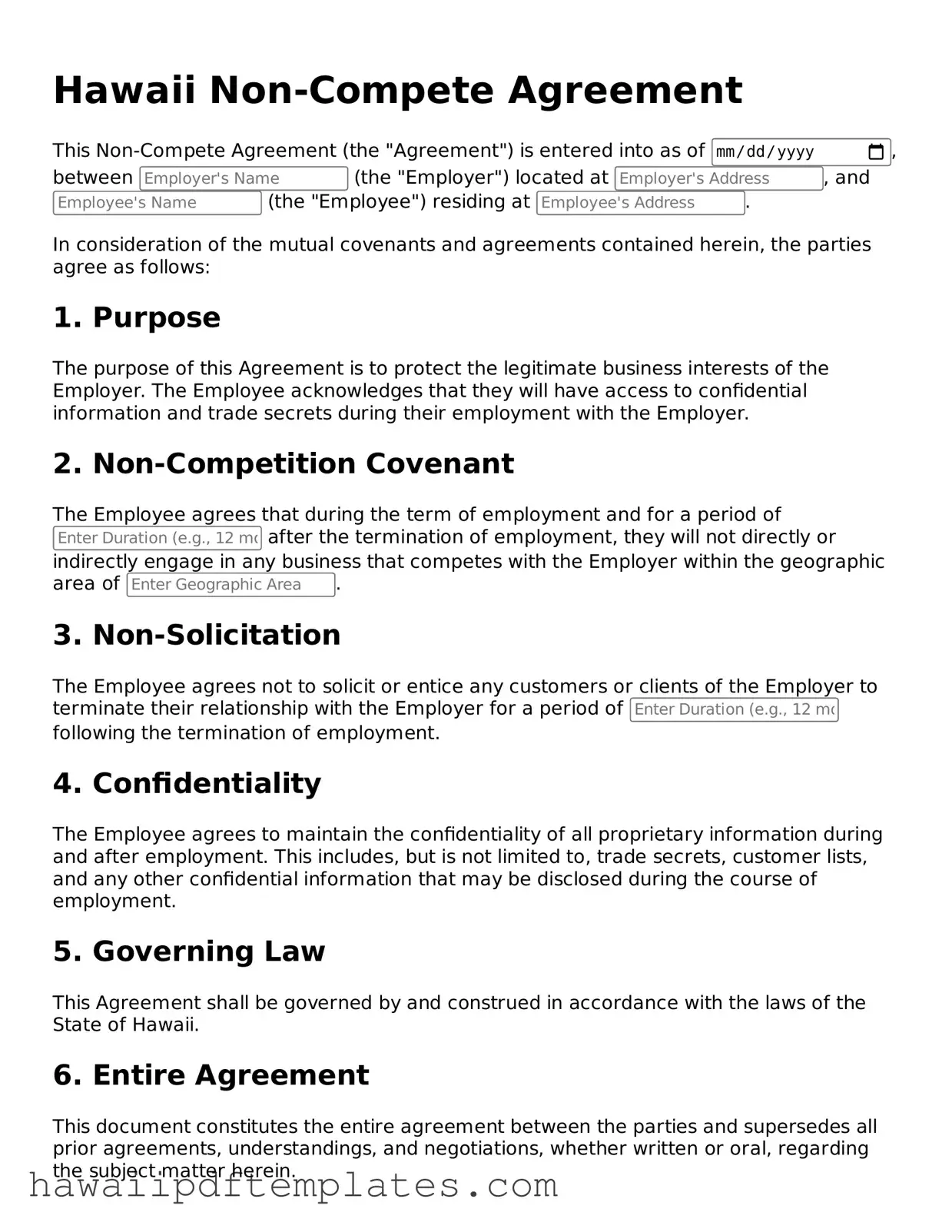Free Non-compete Agreement Document for Hawaii State
Frequently Asked Questions
-
What is a Hawaii Non-compete Agreement?
A Hawaii Non-compete Agreement is a legal document that restricts an employee from engaging in business activities that compete with their employer after leaving the company. This agreement helps protect the employer's business interests, trade secrets, and client relationships.
-
Are non-compete agreements enforceable in Hawaii?
Yes, non-compete agreements can be enforceable in Hawaii, but they must meet specific criteria. The agreement must be reasonable in scope, duration, and geographic area. Courts will examine the agreement to ensure it does not unduly restrict an employee's ability to find work.
-
What should be included in a Hawaii Non-compete Agreement?
A well-drafted non-compete agreement should include:
- The specific activities that are restricted.
- The duration of the restrictions.
- The geographic area where the restrictions apply.
- Any consideration provided to the employee for signing the agreement.
-
How long can a non-compete agreement last in Hawaii?
The duration of a non-compete agreement in Hawaii should be reasonable. Typically, courts look favorably on agreements lasting no longer than one to two years. However, the specific context of the employment and the nature of the business may influence this duration.
-
Can I negotiate the terms of a non-compete agreement?
Yes, employees can negotiate the terms of a non-compete agreement before signing. It's important to discuss any concerns regarding the scope, duration, or geographic limitations. A mutual agreement can lead to a more balanced and fair contract.
-
What happens if I violate a non-compete agreement?
If you violate a non-compete agreement, your former employer may take legal action against you. This could include seeking an injunction to prevent you from working for a competitor or pursuing damages for any losses incurred. It's crucial to understand the potential consequences before signing.
Other Common Hawaii Forms
How to Transfer Property Title in Hawaii - This form is essential for legally recording property ownership changes.
In Florida, utilizing the Florida Residential Lease Agreement form is essential not only for defining the responsibilities of both landlords and tenants but also for ensuring legal protection during the rental process. For more detailed information and to access the form, you can visit floridaforms.net/blank-residential-lease-agreement-form/, which provides valuable resources for anyone entering into a rental agreement.
How to Sell a Car in Hawaii - It allows for a record of the sale date, which can be important for legal reasons.
Steps to Writing Hawaii Non-compete Agreement
Filling out the Hawaii Non-compete Agreement form requires attention to detail. It's important to ensure that all information is accurate and complete. Follow these steps to successfully fill out the form.
- Begin by writing your full legal name at the top of the form.
- Provide your current address, including city, state, and zip code.
- Next, enter the name of the company or business with which you are entering the agreement.
- Fill in the company's address, ensuring you include all relevant details.
- Specify the duration of the non-compete period. This is the length of time you agree not to engage in similar work after leaving the company.
- Clearly outline the geographic area where the non-compete will apply. Be specific about the locations involved.
- Sign and date the form at the bottom. Make sure your signature matches the name you provided at the top.
- If required, have a witness sign the form as well.
Once you have completed the form, review it for any errors or missing information. After confirming everything is correct, submit it to the appropriate party as instructed.
Misconceptions
Many people have misunderstandings about non-compete agreements, especially in Hawaii. Here are six common misconceptions that can lead to confusion:
- Non-compete agreements are always enforceable. This is not true. In Hawaii, these agreements must be reasonable in scope and duration to be enforceable.
- All employees must sign a non-compete agreement. Not every employee is required to sign one. Typically, only those in certain positions or with access to sensitive information are asked to sign.
- Non-compete agreements can last indefinitely. In Hawaii, the duration of a non-compete must be reasonable. Generally, a few months to a couple of years is considered acceptable.
- Non-compete agreements prevent all types of employment. They do not completely bar individuals from working in their field. Instead, they limit competition against the former employer in specific ways.
- Signing a non-compete means you cannot start your own business. This is misleading. While there may be restrictions, starting a business is often possible as long as it does not directly compete with the former employer.
- Non-compete agreements are the same in every state. This is incorrect. Each state has its own laws regarding non-compete agreements, and Hawaii has specific rules that differ from other states.
Understanding these misconceptions can help individuals make informed decisions about their employment and contractual obligations in Hawaii.
